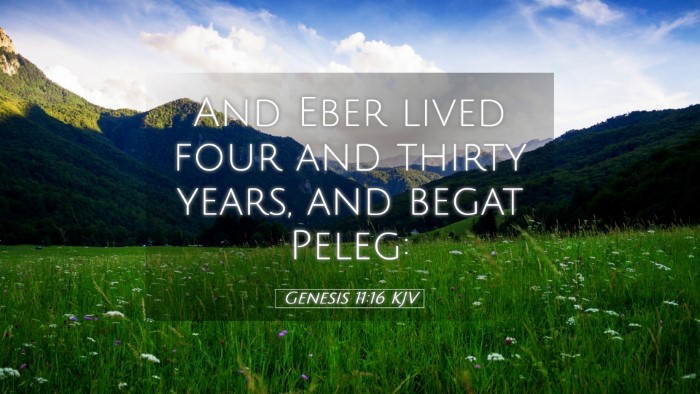Commentary on Genesis 11:16
Verse Context: Genesis 11:16 states, "And Eber lived four and thirty years, and begat Peleg:..." This genealogical entry is pivotal as it continues the narrative of the lineage from Shem through Eber, ultimately emphasizing the significance of Peleg, whose name denotes division, marking a critical point in biblical history.
Historical and Theological Insights
This passage falls within the genealogical sections of Genesis, where the focus is often on lineage and inheritance. Commentaries by Matthew Henry, Albert Barnes, and Adam Clarke offer rich insights into the implications of this verse.
- Matthew Henry:
Henry elaborates on the importance of genealogy in Scripture, stating that such lists provide a historical framework for the unfolding of God’s redemptive plan. Eber, through whom the Hebrew people are descended, signifies the chosen lineage. His naming of Peleg, which means 'division,' foreshadows the divisions that arise post-Babel, indicating God’s sovereignty in scattering nations but also the choice of a particular people for His covenant.
- Albert Barnes:
Barnes remarks on the longevity of Eber’s life, emphasizing his role as a patriarch in the lineage of the Israelites. He suggests that the age at which he fathered Peleg is significant, as it shows the continuity of the promise made to Noah and the unfolding narrative of redemption. The transition from Eber to Peleg also signifies a turning point that would lead to further developments in the biblical narrative, especially in the context of the Tower of Babel.
- Adam Clarke:
Clarke notes the name 'Peleg' and delves into its meaning and implications. His commentary touches on the aftermath of the Babel incident, where the earth was divided, not just geographically but also in languages and nations. Clarke’s insights suggest that Peleg’s life and lineage play a crucial role in understanding the context of the subsequent chapters in Genesis, particularly as they relate to God’s dealing with humanity.
The Significance of Division
The name 'Peleg' carries substantial weight in biblical theology. The division associated with his name serves multiple purposes within the narrative and theological framework:
- Divine Judgment:
The division reflects God’s judgment on humanity's prideful act of building the Tower of Babel (Genesis 11:1-9). The dispersion of nations was a direct result of humanity attempting to usurp divine authority. In this regard, Peleg stands as a symbol of God's sovereign will over human affairs.
- Preservation of a People:
Despite the scattering, God preserves a remnant through the line of Eber, emphasizing His promise to maintain a people for Himself. This preservation theme resonates throughout Scripture, culminating in the establishment of Israel as a nation chosen for God’s purposes.
Lessons for the Church Today
Genesis 11:16, while a genealogical note, presents profound lessons for modern Christians:
- Understanding Our Roots:
Just as the line of Eber signifies God's plan, Christians today are called to understand their spiritual heritage. The New Testament reaffirms that believers are children of Abraham by faith (Galatians 3:7). Recognizing our roots can deepen our faith and identity in Christ.
- Embracing Diversity:
The division that Peleg represents is a testament to God’s diverse creation. The Church today comprises individuals from all nations, languages, and backgrounds, showcasing the beauty of God’s plan for diversity within unity (Revelation 7:9).
Conclusion
Genesis 11:16, while seemingly simplistic, is intricately woven into the grand narrative of Scripture. The commentaries highlight not only the historical lineage but also the theological implications of division and God’s covenantal faithfulness. For pastors, students, and scholars, this verse serves as a reminder of God's sovereign hand guiding history, preserved through chosen lineage, and the profound dimensions of our faith as part of God’s ongoing work in the world.


